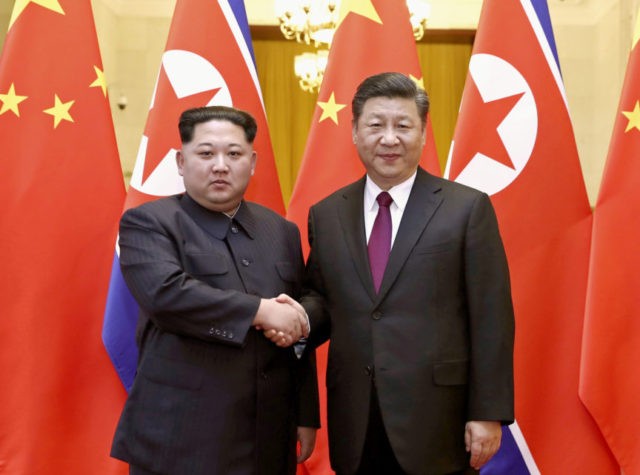Chinese authorities have blocked internet searches for all words and articles deemed critical to North Korean dictator Kim Jong-un, a report from South Korea’s Yonhap News Agency revealed Thursday.
Sources close to the outlet revealed that Chinese censors are blocking such searches amid warming relations between Beijing and Pyongyang, while officials in Beijing are also encouraging state media outlets to run as many positive articles about Kim Jong-un’s regime as possible.
The move comes as the Chinese Communist Party seeks to express its approval of North Korea’s ongoing peace negotiations with its enemies. Kim Jong-un has met South Korean President Moon Jae-in twice and is scheduled to meet President Donald Trump in Singapore next week.
Some of the positive coverage provided by Chinese state media includes touting North Korea’s limited economic and industrial growth, the visits of the regime’s delegations to China, and encouraging the international community to reward any denuclearization with security guarantees.
China’s relationship with North Korea has warmed significantly in recent months. Kim Jong-un has made two foreign trips to meet Xi Jinping in as many months and made Beijing his first ever foreign destination as head of state.
“In a cordial and friendly atmosphere, the top leaders of the two parties and the two countries had an all-round and in-depth exchange of views on China-DPRK relations and major issues of common concern,” state media outlet Xinhua reported at the time.
In the run-up to Kim’s first visit in March, Chinese internet censors blocked searches for the Chinese expression “Jin San Pang,” which translates as ‘Fatty the Third’ to help protect Kim from public criticism.
“When bilateral conflict escalated over North Korea’s missile and nuclear tests last year, China didn’t impose a ban on searches for ‘Jin San Pang,'” a source told Yonhap. “But the phrase has disappeared online after Kim met with Xi in Beijing in March.”
However, some daring Chinese users dodged the ban by coming up with new nicknames, including “The Obese Patient,” “The Fatty on the Train,” “The Visitor from the Northeast,” and “The Sibling Next Door.”
With the rise of the internet and open access to information, the control of trends, opinion, and news has become an increasing priority for the regime, who have turned rampant censorship into a pre-requisite for those using the internet.
Most online censorship comes under the jurisdiction of the “Great Firewall,” which selectively blocks content such as gambling, pornography, criticism of the regime or its allies, political dissidence, and other activities that the government deems harmful to society.
Follow Ben Kew on Facebook, Twitter at @ben_kew, or email him at bkew@breitbart.com.

COMMENTS
Please let us know if you're having issues with commenting.